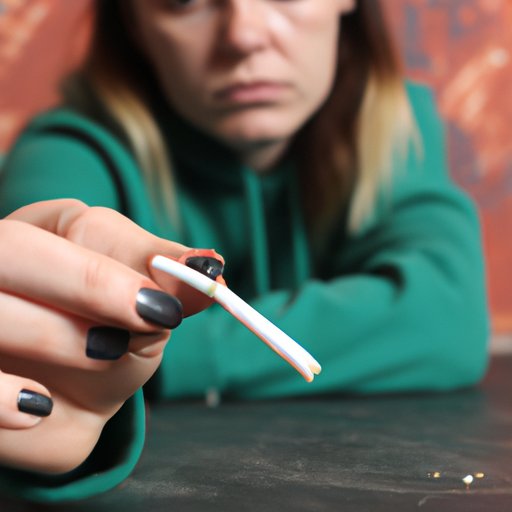
I. Introduction
Quitting weed cold turkey is never an easy task, but with the right support and strategies in place, it is achievable. If you are tired of the negative effects marijuana is having on your life and are ready to quit for good, then this article is for you.
The purpose of this article is to provide you with a comprehensive guide to addiction recovery, offering tips and advice on how to quit weed cold turkey and maintain your sobriety.
In this article, we will explore the importance of building a support system, managing withdrawal symptoms, identifying and changing negative thought patterns, healthy lifestyle choices, mindful living, the benefits of replacing weed with healthier alternatives, and how to avoid relapse.
II. Importance of a Support System
Having a supportive network of people around you is essential when quitting weed cold turkey. Family, friends, and support groups can provide you with the encouragement and accountability you need to stay committed to your goal of sobriety.
To build a supportive network, start by reaching out to the people in your life who you trust and who respect your decision to quit. It is important to communicate your struggle and ask for their support. Joining support groups online or in-person can also provide you with a sense of community and the opportunity to share your experiences with others who are going through the same thing.
Remember, building a support system is not a one-time event. It is important to nurture and maintain these relationships over time by checking in with your support network regularly and being open and honest about your struggles and successes.
III. Quitting Weed
Once you have made the decision to quit weed, you may experience withdrawal symptoms such as anxiety, restlessness, depression, and irritability.
To help manage these symptoms, it is important to prioritize self-care. This includes getting enough sleep, practicing relaxation techniques such as deep breathing and meditation, and staying hydrated.
If you find yourself struggling with cravings, there are several strategies you can try. Distracting yourself with activities you enjoy, practicing mindfulness and gratitude, or seeking the support of your support network can all help you cope with cravings.
IV. Cognitive, Emotional, and Behavioural Strategies
In addition to managing withdrawal symptoms, it is important to identify and change negative thought patterns that fuel addiction. One effective strategy is cognitive-behavioural therapy, which helps you identify and eliminate negative self-talk and behaviours.
Staying motivated during the quitting journey is also essential. Some strategies to help you stay on track include setting achievable goals, tracking your progress, and rewarding yourself for milestones achieved.
Finally, changing routines and avoiding triggers can help you maintain sobriety. For example, if you usually smoke before bed, try reading a book or taking a hot bath instead to help calm your mind.
V. Fitness and Nutrition
Physical exercise and healthy eating can play a big role in addiction recovery. Regular exercise can help reduce stress, improve mood, and boost overall health and wellbeing.
To make healthy food choices, try planning your meals in advance, incorporating a variety of fruits and vegetables, and staying hydrated throughout the day. Remember, good nutrition is essential for maintaining energy levels and overall health.
VI. Mindful Living
Mindful living is a powerful strategy that can help you quit weed for good. Mindfulness involves living in the present moment, practicing gratitude, and focusing on what is important.
Some mindfulness techniques you might try include deep breathing, meditation, or yoga. Simply taking time to practice mindfulness in your daily routine can help you stay centered and focused, even during times of stress or anxiety.
VII. Replacing Weed with Healthier Alternatives
Replacing weed with healthier alternatives can help you maintain sobriety and improve overall wellbeing. Some examples of hobbies or activities that can replace weed include painting, hiking, or even learning a new language.
It is important to note that many people are hesitant to try replacing weed with healthier alternatives because they fear they will never find something that brings them the same level of enjoyment. However, it is important to remember that with time and practice, these new activities can become just as rewarding and fulfilling as smoking weed once was.
VIII. Dangers of Relapse and How to Avoid It
Relapse is a common fear for those trying to quit weed. Setting boundaries and identifying triggers can be helpful strategies to avoid relapse. For example, avoiding social situations where weed is present or reaching out to your support network when you feel triggered can help keep you on track.
Mental health issues such as anxiety and depression can also contribute to addiction. If you are struggling with a mental health issue, seeking professional help is essential. A licensed therapist or mental health professional can help you develop coping strategies and provide you with the support you need to maintain sobriety.
Finally, successful relapse prevention strategies include taking care of oneself physically, emotionally, and mentally, creating a support system, and adopting healthy lifestyle habits.
IX. Conclusion
Quitting weed is not easy, but with the right strategies and support system in place, it is achievable. By building a supportive network, managing withdrawal symptoms, identifying and changing negative thought patterns, making healthy lifestyle choices, practicing mindfulness, and replacing weed with healthier alternatives, you can maintain sobriety and improve overall wellbeing.
If you are struggling with addiction, know that you are not alone. Reach out to your support network, seek professional help, and know that sobriety is possible.
Thank you for reading. We invite you to share your experience and feedback with us.




